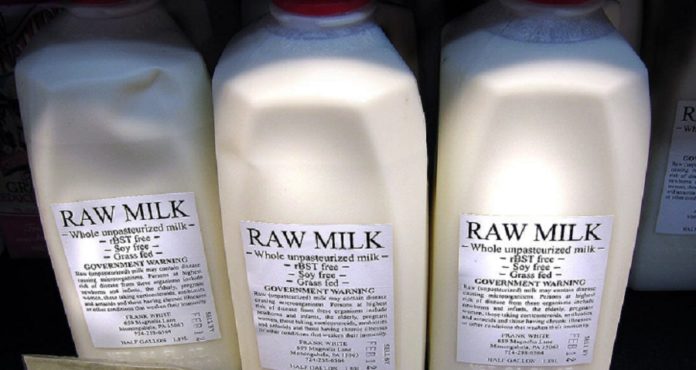Kansas raw milk producers won a big legal battle last year when the state conceded that a 1967 law couldn’t restrict marketing of the product.
The settlement reached in the legal challenge to the statute allowed farmers to advertise raw milk sales beyond what was previously limited to a sign on the dairy farm’s property.
But with one legal victory will come another fight, this time at the Capitol.
The state’s dairy industry is backing legislation that would ban the sale of raw milk, largely in response to last year’s litigation in which the state agreed that the limits on advertising violated the First Amendment.
State agriculture officials have another bill that would put health disclaimers on advertisements for raw milk, also in response to last year’s litigation.
The Kansas Dairy Association wants to ban the sale of unpasteurized milk, fearing the court settlement will lead to the unfettered advertising of an unregulated product that medical experts say carries a health risk.
“That just opens a can of worms,” said Stephanie Eckroat, executive director of the Kansas Dairy Association.

“Now, people can advertise on the radio, on the internet and in the newspaper,” she said. “Some of those people that are advertising are not inspected, they’re not licensed. They’re taking on a huge liability by selling raw milk.”
Health experts have warned about the risks of consuming unpasteurized milk, meaning that it has not been heated to a high enough temperature to kiill bacteria such as salmonella, E. coli and listeria.
The Food and Drug Administration, the Centers for Disease Control and Prevention as well as the American Academy of Pediatrics say that raw milk poses a health risk.
The CDC reported 127 outbreaks, including 1,909 illnesses and 144 hospitalizations, linked to raw milk from 1993 to 2012.
The CDC said many of the illnesses stemming from raw milk involved children.
At least one child under 5 was involved in 59% of outbreaks related to raw milk reported to the CDC from 2007 through 2012.
From 2017 to 2019, the Kansas health department reported 54 confirmed and probable illnesses after someone consumed an unpasteurized milk product.
However, the health department said the exposures were not limited to inside the United States and may not have caused the illness.
While the Food and Drug Administration does not regulate raw milk, it issued a regulation in 1987 barring the product from being sold across state lines.
Kansas is one of 31 states that allow consumers to purchase raw milk, according to the National Conference of State Legislatures. Nineteen states ban the sale of raw milk, NCSL reports. In 12 states, retail stores can sell raw milk.
In Kansas, consumers must purchase raw milk at the farm, which Kansas Agriculture Secretary Mike Beam said was one way to protect the public health “due to the high degree of risk associated with unpasteurized dairy products.”
“We just feel like the science is there,” Eckroat said. “The science is telling us it’s not good to consume raw milk.”
There are at least 45 raw-milk producers in Kansas. Among them is Charlene Peacock, who runs a dairy farm with her family in Augusta, Kansas.
Peacock said she believes raw milk isn’t a health threat so long as the product is treated carefully.
“It does not kill you if it’s treated respectfully from the cow to the consumer as far as cleanliness,” Peacock said.
Peacock believes people who want to drink raw milk should have a choice.
“They are certainly aware of the pro and cons of raw milk,” she said.
“If you take that choice away from them, that to me is infringing on people’s choice and rights.”
She also cautioned that legislation banning the sale of unpasteurized milk would undercut the small dairy farmer.
“It would hurt us, to be honest with you,” she said. “I try to keep the farm self sustaining, and that is one of the incomes for that.”
Mark McAfee, founder of the Raw Milk Institute in Fresno, California, says the opposition to unpasteurized milk comes from milk processors who are afraid of losing business.

“The dairymen don’t like to see competition from raw milk,” McAfee said. “The processors hate raw milk. They can’t stand it. It bypasses them and undermines their marketing of processed milk products.”
Meanwhile, the Kansas Agriculture Department has introduced legislation in response to the settlement reached in the raw-milk advertising case.
The agency is backing a bill that would allow raw-milk advertising but with a disclaimer about the health implications of the product.
The bill would require the ads to state the product hasn’t been pasteurized and “may contain organisms that cause foodborne illness, especially in infants, young children, older adults, pregnant women and people with weak immune systems.”
The bill spells out that letters in the disclaimer must be of uniform size and no smaller than the largest font used elsewhere in the advertisement.
“Because of the risk of consuming raw, unpasteurized milk, the bill sets forth labeling requirements that specifies such milk may contain organisms that can cause foodborne illness,” Beam said in a statement.
Kansas Health Secretary Lee Norman said any advertising related to raw milk needed to address the health risks.
“Raw milk may contain bacteria that cause gastrointestinal diseases, like E. coli, Campylobacter and Salmonella,” Norman said in a statement.
“KDHE urges advertising be clear that, if raw milk is being sold, that consuming unpasteurized milk increases the risk of illness.”

However, Sam MacRoberts, the lawyer who challenged the raw-milk advertising law on behalf of a family dairy farm, sees more constitutional problems with the bill and the proposed labeling.
“We’re certainly disappointed that this bill was introduced,” MacRoberts said. “We think it’s going to have some very serious First Amendment issues.”
MacRoberts is litigation director for the Kansas Justice Institute, which is part of the free-market oriented Kansas Policy Institute.
MacRoberts said the bill is a form of compelled speech and the font requirement would limit some types of ads.
“It sure seems like we’re getting in the business of requiring certain language from raw-milk producers,” he said.
“It does raise First Amendment issues, and we’re taking this very seriously and we’re paying attention to it,” he said.















